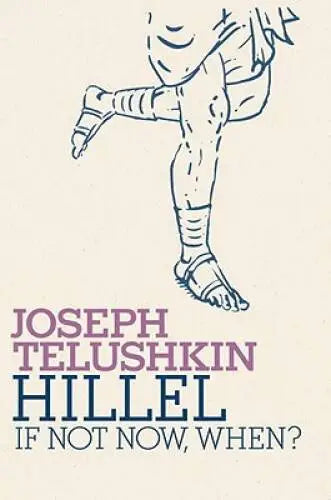Description
“What is hateful unto you, do not do unto your neighbor. That is the whole Torah, all the rest is commentary. Now, go and study.”
This is the most famous teaching of Hillel, one of the greatest rabbis of the Talmudic era. What makes it so extraordinary is that it was offered to a gentile seeking conversion. Joseph Telushkin feels that this Talmudic story has great relevance for us today. At a time when religiosity is equated with ritual observance alone, when few Jews seem concerned with bringing Jewish teachings into the world, and when more than 40 percent of Jews intermarry, Judaism is in need of more of the openness that Hillel possessed two thousand years ago.
Hillel’s teachings, stories, and legal rulings can be found throughout the Talmud; many of them share his emphasis on ethical and moral living as an essential element in Jewish religious practice, including his citing the concept of tikkun olam (repairing the world) as a basis for modifying Jewish law. Perhaps the most prominent rabbi and teacher in the Land of Israel during the reign of Herod, Hillel may well have influenced Jesus, his junior by several decades. In a provocative analysis of both Judaism and Christianity, Telushkin reveals why Hillel’s teachings about ethics as God’s central demand and his willingness to encourage the process of conversion began to be ignored in favor of the stricter and less inclusive teachings of his rabbinic adversary, Shammai.
Here is a bold new look at an iconic religious leader.
This is the most famous teaching of Hillel, one of the greatest rabbis of the Talmudic era. What makes it so extraordinary is that it was offered to a gentile seeking conversion. Joseph Telushkin feels that this Talmudic story has great relevance for us today. At a time when religiosity is equated with ritual observance alone, when few Jews seem concerned with bringing Jewish teachings into the world, and when more than 40 percent of Jews intermarry, Judaism is in need of more of the openness that Hillel possessed two thousand years ago.
Hillel’s teachings, stories, and legal rulings can be found throughout the Talmud; many of them share his emphasis on ethical and moral living as an essential element in Jewish religious practice, including his citing the concept of tikkun olam (repairing the world) as a basis for modifying Jewish law. Perhaps the most prominent rabbi and teacher in the Land of Israel during the reign of Herod, Hillel may well have influenced Jesus, his junior by several decades. In a provocative analysis of both Judaism and Christianity, Telushkin reveals why Hillel’s teachings about ethics as God’s central demand and his willingness to encourage the process of conversion began to be ignored in favor of the stricter and less inclusive teachings of his rabbinic adversary, Shammai.
Here is a bold new look at an iconic religious leader.
Payment & Security
Your payment information is processed securely. We do not store credit card details nor have access to your credit card information.

